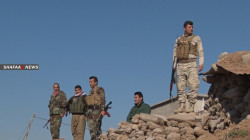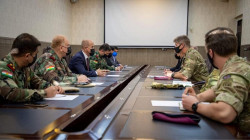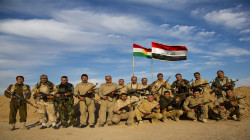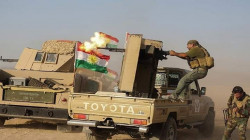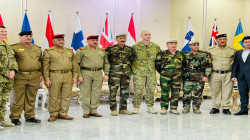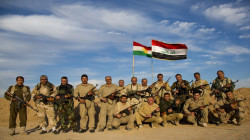Challenges loom as Peshmerga and Iraqi Army prepare for joint operations
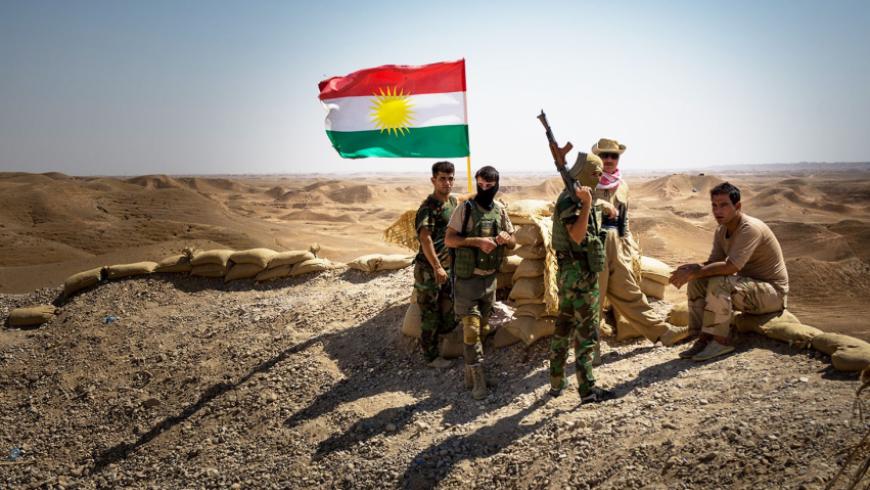
Shafaq News / With military operations on the horizon within the joint coordination zones shared by Peshmerga and the Iraqi army, military experts are expressing reservations about the efficacy of the two coordinating brigades in addressing and containing security gaps.
In parallel, the representative of the Kurdistan Region (KRI) within the Joint Operations Command, Brigadier General Abdul Khaliq Talat, stressed that the initiation of these operations, both in terms of field deployment and military execution, hinges upon the release of requisite financial allocations.
Talat, speaking exclusively to Shafaq News Agency, detailed that the "comprehensive structuring of both brigades, including their distribution and mandates, aligns with a meticulously devised military strategy endorsed jointly by the Ministries of Defense and Peshmerga."
Acknowledging that "the two brigades may not possess adequate military strength to comprehensively address the unattended security zones of mutual concern," the KRI's representative within the Joint Operations Command, however, portrayed this endeavor as a "preliminary experiment and a stepping stone toward the future formation of novel collaborative forces."
Talat proceeded to expound that "the constitution of supplementary joint forces uniting Peshmerga and the Defense Ministry will be subject to assessments and military appraisals conducted by pertinent security leaders." He emphasized the distinctive character of the security gaps to be handled by the two coordination brigades, denoting them as "singular military affairs within the purview of both the Joint Operations Command and Peshmerga."
Brigadier General Jabar Yawar, a retired military expert and Peshmerga authority, affirmed that "the expanse of security gaps, spanning from Khanaqin to the Syrian border, between federal forces and Peshmerga, exceeds 650 square kilometers. Relying solely on the two coordination brigades will not suffice to comprehensively address and contain these gaps; additional forces are necessary."
Yawar noted that "these gaps are concentrated between Tuz Khurmatu in eastern Salahin and the Kifri district, as well as between the Kifri district and Khanqin. Further voids exist between Kirkuk and the Dibis district in the eastern part of the governorate, as well as in the Makhmour Mountains and Nineveh plains."
He highlighted the roles of the two brigades, emphasizing their task of "containing and addressing the security gaps between federal forces and Peshmerga deployments, stretching from Khanqin in Diyala to the Sahila area near the Syrian border. The first brigade's jurisdiction extends from Khanqin to areas south of Kirkuk, while the second brigade's reach encompasses the northeastern Kirkuk regions, extending to the Syrian border in the Sahila area."
Yawar cautioned that "the units deployed within these vacant and active gaps will not be sufficient to entirely eliminate the ISIS threat; their impact will be in diminishing its presence and activities."
He sounded the alarm about the potential risk posed by "sleeper cells present in the unattended gaps and territories harboring terrorist ideologies sympathetic to ISIS."
Yawar revealed an impending meeting between the Ministries of Peshmerga and Defense to "chart plans and mechanisms for initiating field military operations for the two coordination brigades once budgetary approvals are secured, executed, and entail financial provisions for the brigades in upcoming periods."
The bilateral coordination pact between the Ministries of Defense and Peshmerga encompasses four primary provisions: firstly, the establishment of joint coordination centers; secondly, bridging security gaps between the army and Peshmerga; thirdly, setting up shared checkpoints between the two sides; and fourthly, expansive operations in sectors aimed at sweeping territories and pursuing ISIS strongholds and hideouts. This agreement also encompasses the exchange of security and intelligence information to counter terrorism.
It is noteworthy that this agreement has been deferred for nearly two years due to financial allocations and logistical protocols overseen by the federal government and the Ministry of Defense.
The security gaps between the Iraqi army and Peshmerga forces remain a significant hurdle in efforts to combat lingering ISIS elements in the country. These gaps traverse the north from the Syrian border through Nineveh, Salahin, Kirkuk, and extend to Diyala on the Iranian border.
